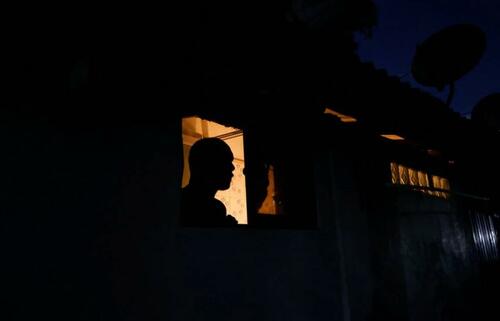Sri Lanka Turns Off Street Lights As Energy Crisis Worsens; Fishermen Unable To Sail For Lack Of Fuel
Tiny Sri Lanka is struggling through an economic crisis that is having terrible repercussions for its economy, as a brutal energy crisis threatens to blossom into shortages of food and other essential goods.
Thanks to an energy crisis (and China’s reluctance to allow the country to restructure its debts), Sri Lanka is resorting to turning off its street lights to save electricity as its worst economic crisis in decades bites, forcing – among other cutbacks – the temporary closure of the local stock market as the impact of the crisis is felt (the Colombo Stock Exchange reduced daily trading to two hours from the usual four-and-a-half because of the power cuts for the rest of this week at the request of brokers).
The island nation of 22 million people is struggling with rolling power cuts for up to 13 hours a day as the government is unable to make payments for fuel imports because of a lack of foreign exchange.
According to Reuters, the energy-drained country expects a diesel shipment paid for under a $500 million line of credit from neighboring India is expected to arrive on Saturday, but the situation isn’t expected to improve any time soon, as power restriction will need to continue, according to the country’s power minister.
“We have already instructed officials to shut off street lights around the country to help conserve power,” Power Minister Pavithra Wanniarachchi told reporters.
…
“Once that arrives we will be able to reduce load shedding hours but until we receive rains, probably some time in May, power cuts will have to continue,” Wanniarachchi told reporters, referring to the rolling power cuts.
“There’s nothing else we can do.”
Another reason for the power crisis (and a lesson for all nations that are aiming to ramp up ‘green’ energy sources): Water levels at reservoirs feeding hydro-electric projects had fallen to record lows, while demand had also hit record levels during the hot, dry season, she said.
As Reuters explains, the crisis in Sri Lanka is the result of a confluence of factors that have drained the country’s foreign exchange reserves.
The crisis is a result of badly timed tax cuts and the impact of the coronavirus pandemic coupled with historically weak government finances, leading to foreign exchange reserves dropping by 70% in the last two years.
Sri Lanka was left with reserves of $2.31 billion as of February, forcing the government to seek help from the International Monetary Fund and other countries, including India and China.
And if the situation doesn’t improve soon, the small country’s energy crisis could metastasize into a food crisis. Because, as the AFP explains, without fuel, the country’s fishermen have been stranded on shore, unable to reel in the day’s catch. And the ramifications are being felt by families across the country.
“If we queue up by five in the morning, then we will get fuel by three in the afternoon, on good days,” Arulanandan, a seasoned member of Negombo’s close-knit fishing community, tells AFP.
“But for some, even that is not possible, because by the time they get to the end of the queue, the kerosene is gone.”
As they look for somebody to blame, the locals have settled on one key culprit: Beijing, and its ‘debt diplomacy’, which seems to have caught Colombo in its trap.
One of the reasons behind economic crisis in Sri Lanka is its huge debt to China.
Sri Lanka asked China to restructure debt repayments.
China will implement its debt trap diplomacy in Sri Lanka
Instead of claiming Indian territory, Nepal should learn from the Sri Lankan crisis
— Anshul Saxena (@AskAnshul) March 31, 2022
Tyler Durden
Thu, 03/31/2022 – 20:00
via ZeroHedge News https://ift.tt/XPEBcl8 Tyler Durden
